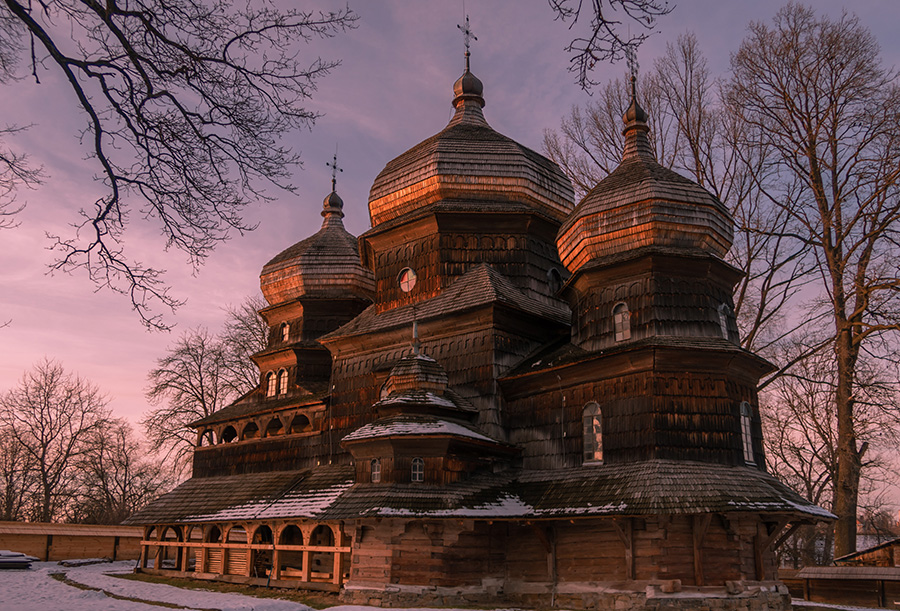Location: Guelph, Ontario
Date of Completion: 1962
Architect: Evhen Gren
Nominated by: Mike Schreiner, MPP (Guelph)
Expressive of the traditions and heritage of the community it serves, Guelph’s Holy Protection of Mother of God Ukrainian Catholic Church stands proudly as a symbol of Ukrainian culture in Canada.
Canada’s Ukrainian Heritage
With close to 1.5 million residents across the country self-identifying as fully or partially Ukrainian in origin, Canada holds the distinction of having the third-largest Ukrainian population after Ukraine itself and Russia.
Ukrainian immigrants started settling in Canada in the late 1800s when thousands of farming families from regions like Galicia and Bukovyna migrated to the prairie provinces in search of a better life. By the early 1900s Ukrainian communities had been established across the country, not only in rural regions but also around urban centres including areas of southern Ontario. Subsequent waves of Ukrainian immigration occurred after each World War, with the last wave having the largest impact on urban centres as professionals and workers—many displaced or arriving political refugees—made their way to Canada.
Throughout this long history of immigration, Ukrainian churches, such as Guelph’s Holy Protection of the Mother of God Ukrainian Catholic Church, have played an important role as community hubs—a welcoming place for newcomers to arrive, and a sanctuary for the diaspora to maintain its traditions and rituals. This role continues to this day as Ukrainian churches and their congregations have been the first point of contact for many new Ukrainian refugees fleeing the Russian war.
 St. George’s Church in Drohobych is a 15th century timber Ukrainian Church exhibiting similar features to St Mary’s, including three part plan, onion domes, and the tallest dome over the nave. Photo: Elena Kurylo, Wikiwand.
St. George’s Church in Drohobych is a 15th century timber Ukrainian Church exhibiting similar features to St Mary’s, including three part plan, onion domes, and the tallest dome over the nave. Photo: Elena Kurylo, Wikiwand.
An Example of Eastern Rite Architecture in Canada
With such a sizable and long-standing immigration history, it is no surprise Ukrainian architecture has also made its way into Canada's built environment. This is particularly evident in the prairies, where a vast collection of beautiful Ukrainian churches, ranging from early settlement period single-room log churches to highly ornate Ukrainian Baroque monuments, showcase the diversity of styles emanating from different regions and periods of the homeland. In Ontario, many of the Ukrainian churches we see today date to the post-war period.
Starting construction in the 1950s, Guelph’s Holy Protection of the Mother of God Ukrainian Catholic Church, also known as St Mary’s, is part of this unique Ukrainian-Canadian story. Designed by Toronto architect Evhen Gren, the church showcases many of the architectural elements tied to traditions of Eastern Rite Catholic churches. In particular, much of St Mary’s design stems from Ukraine’s Boyko region’s distinct style of Ukrainian Greek Catholic Church architecture. This includes large visible elements like its dome and hip roof, as well as underlying organisational logic like its east-west layout and tripartite floor plan.
On the outside, St Mary’s most distinctive feature is its three lantern top onion domes sitting upon drums. Following Boyko architectural tradition, the three domes (with the number three symbolizing the Holy Trinity) are arranged on one line, with the middle dome being the tallest of them all. The domes also reveal the organisation of the spaces below, with one dome over each part of the tripartite plan: narthex (entrance), nave (main gathering space), and sanctuary.
The entire church is laid out in a mostly east-west axis, with the east reserved for the most sacred space (the sanctuary) and the west for the narthex.
Inside, an elaborate Iconostasis—or wall of icons—separates the sanctuary from the nave, marking the border between humanity and divinity. Designed by Adriadna and Oleg Krayevsky and developed between 1963 and 1993, the iconostasis references Ukrainian baroque architecture and is a traditional element of all Eastern Rite churches.
This post forms part of our World Architecture Day Queen’s Park Picks 2022 series in which the OAA asked Ontario’s Members of Provincial Parliament (MPPs) to nominate a prominent building, past or present, in their riding for a chance to learn more about it. Check out the rest of the series to learn more about great buildings across the province!
Additional Resources
Interested in learning more about the Holy Protection of the Mother of God Ukrainian Catholic Church and Ukrainian Catholic churches in Canada? Check out these additional resources: